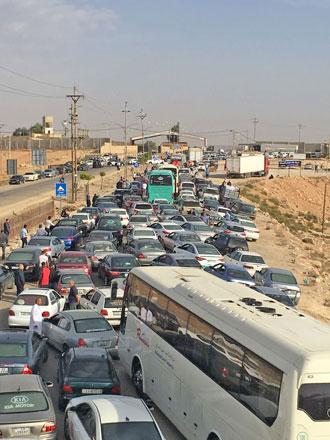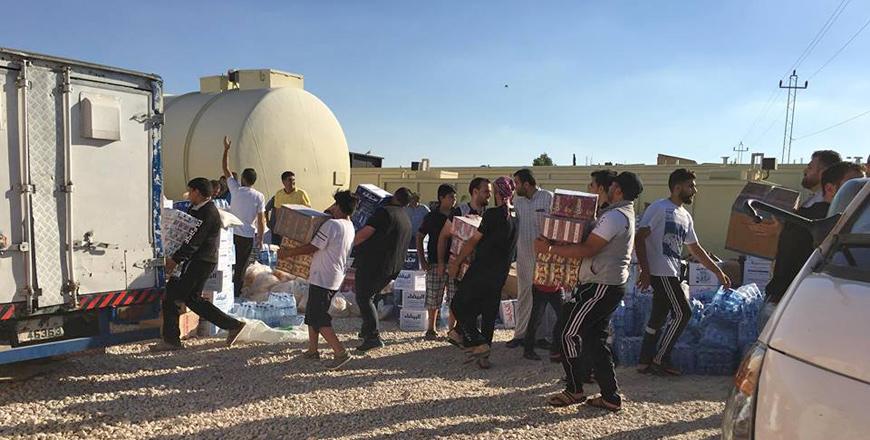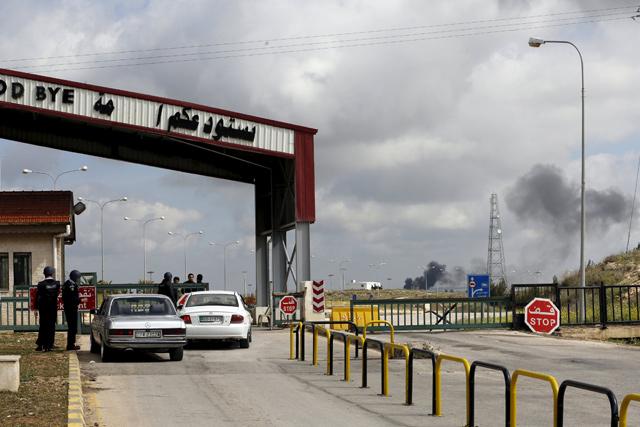You are here
Following border reopening, Jordanians rush to revisit northern neighbour
By Muath Freij - Oct 31,2018 - Last updated at Oct 31,2018

Crowds are seen waiting to cross the border with Syria over the last weekend (Photo by Muath Freij)
JORDANIAN/SYRIAN BORDER — Sitting inside his vehicle waiting for hours to enter Syria, Hatem Bani Hani could not contain his excitement over visiting Damascus.
The 23-year-old said he had been longing for years to visit Syria, adding that his cherished memories of Damascus, better known as “Sham”, always haunted him.
“I missed Sham and we wanted to revive our memories there,” he said as he was waiting his turn to cross the border.
Bani Hani was among the hundreds of Jordanians who flocked to the border crossing on Thursday to pay a visit to the neighbouring country.
Some of them were going for pleasure, while others were going for business purposes.
The Jaber/Nasib crossing between Jordan and Syria was back to business as usual earlier this month, after it was reopened for passenger and cargo movement under certain conditions agreed to between the two countries.
In 2015, Jordan closed the Jaber border crossing with Syria due to security reasons, while Ramtha, the other border crossing, had been closed for more than five years.
Since the reopening of the crossing last week, more than 1,000 Jordanians have crossed into Syria, a customs officer told The Jordan Times in a previous interview.
Omar Fandi, a Ramtha resident, said both Ramtha and Jordan were affected following the closure of the border.
“Since the opening of the borders, we have noticed that the country seems refreshed, economically,” he said as he was sitting in a car.
Jordanian motorists hailed the reopening of the borders after the closure withered their transportation and trade businesses, many of them added.
Jawad Zoubi, a driver, recalled that the lucrative border crossing allowed him to continue his studies and meet the needs of his family, however, when the border was closed the “golden days seemed gone with the wind”.
“Ramtha residents do not usually depend on traditional jobs, they rely on transportation and trade businesses because this is something they inherit from generation to generation,” he said as he was transporting a passenger.
He commended the efforts by the security department personnel for their work to try as hard as possible to facilitate their entrance and cope with the waves of vehicles.
Tourist offices also began operating trips to Syria as soon as the border opened. Rasheed Nabulsi, a guide who joined a tourist group heading to Syria, said their office was among the first to offer trips to Damascus.
“The first trip to Syria consisted of 30 people [earlier this month]. On Thursday’s trip, a total of 100 are heading to Syria,” he told The Jordan Times as he was waiting outside one of the two buses heading to Damascus.
He added that they had received many phone calls from people wanting to know about the trips, however, they were not booked to capacity yet because some people were still concerned about going to Syria.
Mohammad Obeidat, who was having a weekend outing in Syria, was not one of those security-concerned people.
“I have no security concern about going to Damascus. We wanted to enjoy our time there,” he added.
Others, such as Fatima Hindawi, a Syrian who is married to a Jordanian and has lived in Jordan for 30 years, were travelling back to visit with family.
“I want to visit my family in Damascus and we were so eager to have the borders opened so that I can visit them. I used to go by plane when the borders were closed, but it was expensive and you have to come hours ahead of the flight, now it is much easier,” she added.
Ibrahim Zoubi, an owner of a restaurant near the border, was renovating his facilities to prepare for new clients once again. “The good days are back,” he told The Jordan Times.
Related Articles
RAMTHA/AMMAN — Residents of Ramtha on the borders with Syria said they are “sure” of their abilities to restore their northern district’s lo
AMMAN — Citizens in Ramtha and Mafraq have been collecting donations to be sent to Syrians displaced in the areas across the border with Jor
AMMAN — A private sector delegation headed to Damascus on Tuesday to discuss prospects of cooperation with their Syrian counterparts.A well-




















